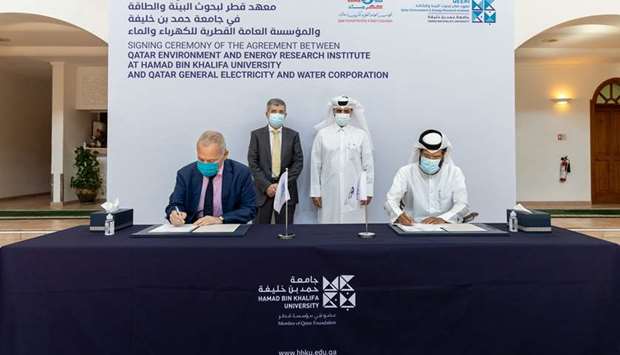The Qatar General Electricity and Water Corporation (Kahramaa) and Hamad Bin Khalifa University (HBKU), represented by its Qatar Environment and Energy Research Institute (Qeeri), have signed a co-operation framework to benefit from the Qeeri’s laboratories.
The ceremony took place at the HBKU headquarters in the presence of Kahramaa president Essa bin Hilal al-Kuwari, HBKU president Dr Ahmad M Hasnah, and Qeeri executive director Dr Marc Vermeersch.
The agreement was signed by Kahramaa's technical affairs director Ahmed al-Nasr and Dr Vermeersch.
As Kahramaa and the Qeeri aim to increase their efforts to develop the water sector, improve the environment, and build a sustainable economy in line with the goals and objectives of Qatar National Strategy 2018-2022, the agreement is to establish co-operation to develop joint projects in relation to research regarding laboratories and materials, especially those related to the field of water and its quality.
It also includes service agreements for Kahramaa to benefit from the expertise and resources at the Qeeri, which are to be provided as needed under this agreement.
It also includes preparing reports that clarify the achievements and the results of the important research that will be carried out.
Al-Kuwari said that Kahramaa will benefit from the laboratories of the Qeeri in several subjects, on top of which is water quality and measures of devices and equipment used in the water sector.
Dr Hasnah said: “Our collaboration will enable Kahramaa to leverage the Qeeri’s technical and scientific expertise to support their institutional mandate, and the country’s priorities, in the areas of renewable energy and water quality.
“Our joint activities will no doubt foster innovation that meets the mutual interests of both institutions, especially toward building a sustainable economy in line with national goals and objectives.
“I am confident our combined efforts will contribute considerably to innovative research and development and amplify our individual efforts on renewable energy.”
This co-operation will contribute to achieving the maximum benefit of natural resources according to global environmentally friendly systems to provide a clean, healthy, integrated and safe environment for future generations.
"Such projects will support innovation and development in a way that will be reflected on Qatar's objectives with regard to a self-sustainable society that meets smart cities’ modern life requirements,” said Dr Vermeersch. “The projects will also support Qatar’s steps towards a green future, achieve an economic and environmental balance, to ensure the sustainability of water, energy and environment projects.”
The agreement was signed by Kahramaa's technical affairs director Ahmed al-Nasr and Dr Vermeersch.
As Kahramaa and the Qeeri aim to increase their efforts to develop the water sector, improve the environment, and build a sustainable economy in line with the goals and objectives of Qatar National Strategy 2018-2022, the agreement is to establish co-operation to develop joint projects in relation to research regarding laboratories and materials, especially those related to the field of water and its quality.
It also includes service agreements for Kahramaa to benefit from the expertise and resources at the Qeeri, which are to be provided as needed under this agreement.
It also includes preparing reports that clarify the achievements and the results of the important research that will be carried out.
Al-Kuwari said that Kahramaa will benefit from the laboratories of the Qeeri in several subjects, on top of which is water quality and measures of devices and equipment used in the water sector.
Dr Hasnah said: “Our collaboration will enable Kahramaa to leverage the Qeeri’s technical and scientific expertise to support their institutional mandate, and the country’s priorities, in the areas of renewable energy and water quality.
“Our joint activities will no doubt foster innovation that meets the mutual interests of both institutions, especially toward building a sustainable economy in line with national goals and objectives.
“I am confident our combined efforts will contribute considerably to innovative research and development and amplify our individual efforts on renewable energy.”
This co-operation will contribute to achieving the maximum benefit of natural resources according to global environmentally friendly systems to provide a clean, healthy, integrated and safe environment for future generations.
"Such projects will support innovation and development in a way that will be reflected on Qatar's objectives with regard to a self-sustainable society that meets smart cities’ modern life requirements,” said Dr Vermeersch. “The projects will also support Qatar’s steps towards a green future, achieve an economic and environmental balance, to ensure the sustainability of water, energy and environment projects.”

